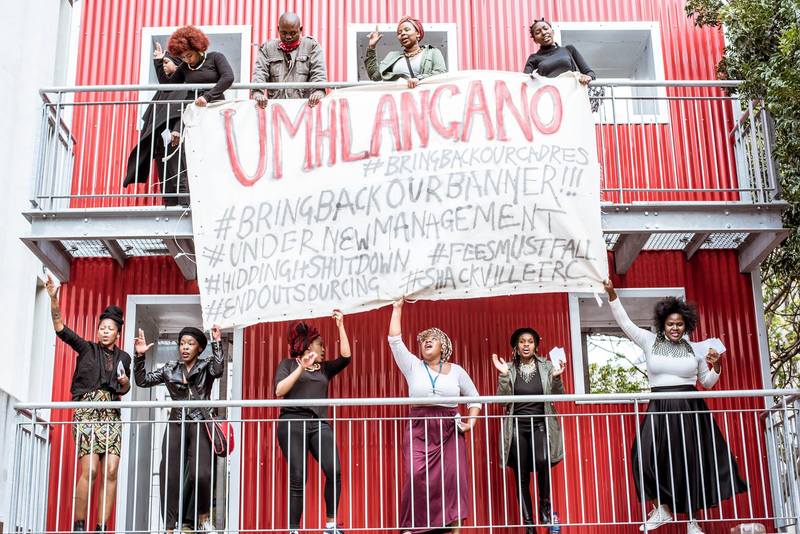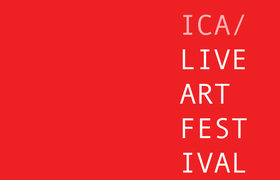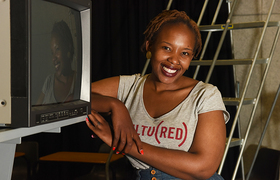The art of decolonisation
24 August 2017 | Story Kate-Lyn Moore. Photo Umhlangano.
The 3rd Space Symposium was first imagined in a time of great contestation in tertiary education.
The Rhodes Must Fall and Fees Must Fall movements brought issues such as representation, access to education, knowledge, identity and heritage to the fore.
Understanding that the creative and performing arts do not exist in a vacuum, how then are arts institutions embroiled in these critical issues?
These are some of the questions that are taken up by the 3rd Space Symposium, Decolonising Art Institutions, which takes place from 24 to 26 August.
“The intellectual challenge here is not merely to wipe the slate clean, but to consider mechanisms for repositioning the creative arts ...”
The interdisciplinary symposium is a collaboration between UCT’s Institute for Creative Arts (ICA) and Michaelis Galleries, the Wits School of Arts and the Zürcher Hochschule der Künste.
It includes a line-up of thought leaders on issues such as feminism, race, art and popular culture.
Creative and performing arts departments and institutions hold a central place in capturing some of the dominant features in the process of decolonisation: language, metaphor, symbolism, modes of representation and cultural capital, prompts the ICA.
“The shrinking of an arts industry along the lines of colonial culture pursued in historically unchanged conservatories is another prompt for this link between the creative arts and the call to decolonise the curriculum.
“The intellectual challenge here is not merely to wipe the slate clean, but to consider mechanisms for repositioning the creative arts in a society that faces several crises in the development of a fledgling democracy.”
A multidisciplinary approach
The two-and-a-half-day programme is arranged into a series of critical engagements at the A4 Studios. These are interspersed with a variety of exhibitions and performances, held at Hiddingh Hall. (A shuttle will be provided between these two venues.)
Heading up the symposium are Associate Professor Hlonipha Mokoena and Professor Desiree Lewis. Associate Professor Zimitri Erasmus and Professor Lwazi Lushaba will respond.
Associate professors Jyoti Mistry and Adam Haupt, Professor David Andrew, Dr Khwezi Mkhize, Zen Mari and Mandla Mbothwe are also due to speak. They will address topics such as whiteness, patronage and the role of art schools within the university.
Lewis will open with her keynote address, “Cultural Studies in South Africa: In Search of a Third Space”. Lewis has written extensively about feminism, sexuality and race, South African literature, and popular and visual culture.
Mokoena’s address, entitled “Headspace/Heartspace: Art and the Archives”, speaks to how art has framed her work as a biographer, social scientist and intellectual historian.
Although the line-up of speakers, exhibitions and performances is designed to inform, provoke and inspire attendees, the symposium also emphasises engagement in smaller groups.
The 3rd Space Programme includes a number of performances, such as the poignant Womb of Fire by artist Rehane Abrahams. It will also play host to the South African premiere of the multimedia installation When I grow up I want to be a black man, by Jyoti Mistry.
Other voices to be heard at the event are those of Berni Searle, Mark Fleishman, Brian Kamanzi, Rike Sitas, members of Umhlangano, Unathi Kondile, Lisa Wilson, Maxwell Rani, Rebekka Sandmeier, Sandile Ndelu, Ian-Malcolm Rijsdijk and Veronica Baxter.
The symposium takes place from 24 to 26 August at the A4 Studios in Buitenkant Street and at Hiddingh Hall.
Registration is free of charge but spaces are limited.
 This work is licensed under a Creative Commons Attribution-NoDerivatives 4.0 International License.
This work is licensed under a Creative Commons Attribution-NoDerivatives 4.0 International License.
Please view the republishing articles page for more information.










